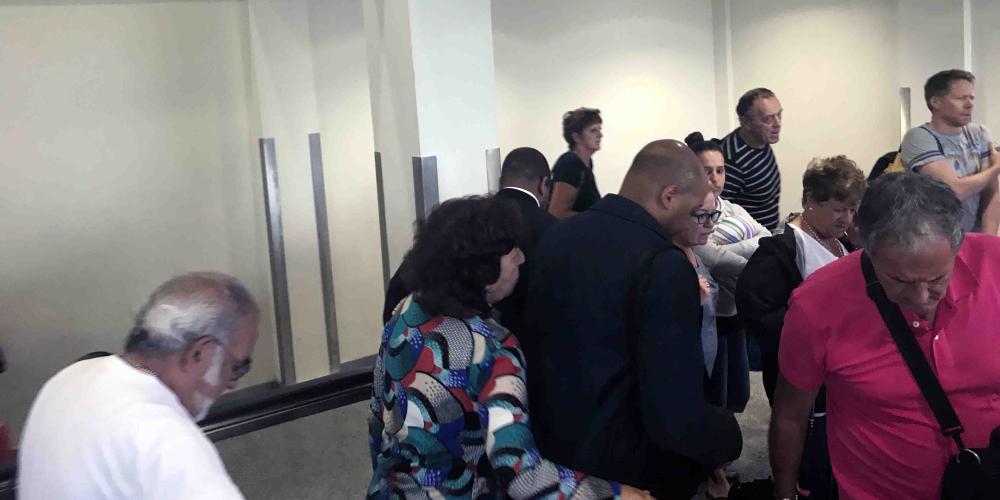Angel in Angola’s Airport
How did he know that I spoke English? How did he know where I was going?
Airports are a maze of security lanes, passport control lines, and waiting rooms.
But are they also a home to angels?
A TAAG Angolan Airlines airplane deposited me late one evening in Angola’s capital, Luanda, after a three-hour flight from Johannesburg, South Africa.
I had a two-hour layover before catching a TAAG flight to the island nation of São Tomé and Príncipe, which like Angola is a former Portuguese colony. I was in the middle of a three-week trip to collect mission stories in the Seventh-day Adventist Church’s Southern Africa-Indian Ocean Division.
At the designated time printed on my boarding pass, I got into a long waiting line to enter the departure area. But when I offered my boarding pass, the airline representative turned me away with a wave of her hand and a slew of Portuguese words. Seeing my confusion, she summoned a security officer, who explained that I needed to wait 20 minutes.
Twenty minutes later, the airline representative accepted my boarding pass and directed me into a crowded room. I waited 15 minutes.
Then another airline representative called out, “São Tomé!” I joined a crowd waiting to take an escalator down to the departure area on the ground floor. But this airline representative, guarding entry to the escalator, rejected my boarding pass with a fresh slew of Portuguese words. No security officer was present to interpret, and I guessed I would have to wait 20 minutes.
Other passengers streamed down the escalator, and soon only a few people remained in the room. I decided to go.
Nobody remained at the escalator to check my boarding pass. At the bottom of the escalator, I joined a long, chaotic line of people waiting for a bus to the airplane.
The minutes ticked by, and no bus came.
Then a young man with brown hair and a tan knapsack slung over his shoulder cut in front of me in line. Idly, I wondered why he hadn’t gone to the back of the line. But I wasn’t bothered; the line was chaotic, and I didn’t care who got on the bus first.
After a few minutes, the man looked at me and said, “My English.”
I had no idea what he meant. I guessed that he only spoke Portuguese.
The man gestured toward the crowd around us.
“This flight is to Portugal,” he said, speaking in slightly accented English. “São Tomé is over there.” He pointed down the hall.
“Thank you!” I exclaimed — and ran.
Sure enough, a bus stood waiting down the hall, and its doors closed shortly after I boarded.
Seated on the sparsely filled airplane, I thought back to the stranger in the airport. How did he know that I spoke English? I hadn’t communicated with anyone. How did he know where I was going? My boarding pass had been tucked in my pocket. Why did he cut in front of me in line and single me out of the crowd?
Arriving two hours later in São Tomé, I was met at the airport by Eliseu R. Xavier, the secretary and treasurer for the Seventh-day Adventist Church in the country, and Milton Oliveira de Ceita, the local church leader responsible for Adventist Mission.
Both men declared that God had saved me. I learned that if I had missed the flight, I would have been stranded for three days in Luanda. The airline only flies to São Tomé three times a week. Moreover, without an Angolan visa, I would have been stuck at the Luanda airport. Finally, a delay would have destroyed my plans to collect mission stories in five countries in three weeks.
“How did the stranger know that I spoke English?” I asked the São Tomé church leaders.“How did he know that I was flying to São Tomé? Why did he speak to me?”
“He was an angel,” Milton said, thoughtfully.
His answer makes sense. While in Africa, I heard mission stories about witchdoctors being baptized, evil spirits being cast out, and night dreams pointing to Jesus. I realized that God also had a special blessing for a church worker trying to catch a late-night flight. God truly works miracles in the lives of those called according to His purpose. “And we know that all things work together for good to those who love God, to those who are called according to His purpose” (Romans 8:28; NKJV).
I have no doubt. Airports also are home to angels.





